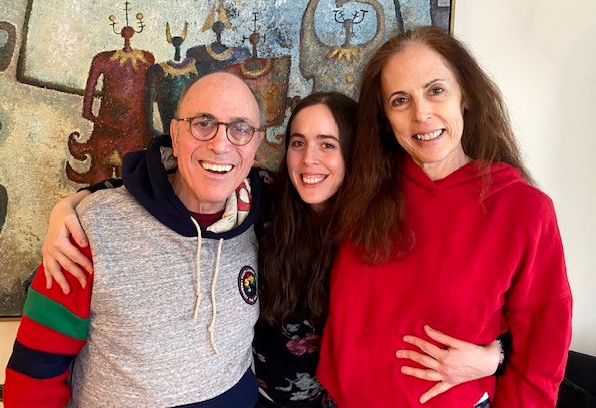For many years I’ve been thinking about how and where our daughter Samantha (now 30) could live independently. She doesn’t belong – nor does she want to be – in a group living situation and she is not yet ready to live on her own. After surviving 5 years of roommates at Landmark College and Pace University, it was clear that sharing a room with strangers would never be Samantha’s cup of tea.

Howard, Samantha and Marguerite Elisofon in their living room
“I’d rather live with a boyfriend who will one day be my husband,” she explained, as if her preference would magically yield Prince Charming and a cozy apartment for them to share. At the time, Samantha had successfully managed a 3-year relationship with an Aspie, living with him part-time in a small studio, so her hope was not totally unreasonable.
My daughter’s dream is my dream. But how could we achieve it? Samantha receives SSDI and a small housing subsidy through her Self-Direction program. This stipend is not enough (and probably never will be) for living in Manhattan – the only community she has ever known, where all of her friends reside.
“Why can’t you buy me an apartment like some of my friends’ parents did?” Samantha asked many times.
“We can’t afford it,” was our oft-repeated refrain.
Still, we needed a solution. I signed up for housing lotteries, checked with Housing Ambassadors and even joined a group of parents whose goal was to find safe affordable apartments in Manhattan for our adult kids with or without support. None of these possibilities came to fruition. Clearly, I could not rely on “the system” or anyone else. I knew I had to find an idea that would work for Samantha, who has yearned to be independent from the time she was a preemie infant in her crib struggling to turn her head. When she was stuck face down and I gently nudged her cheek, Samantha immediately turned in the opposite direction and screamed in fury. Our daughter has always been uber-determined to accomplish as much as possible on her own.
In the meantime, Samantha continues to live with us in the rental where she grew up. But after her twin brother moved to Los Angeles in 2016, we started to think about buying an apartment. We no longer needed a third bedroom (though having a den was nice). Crunching the numbers, my husband figured that if we continued to rent our current Manhattan apartment, we’d probably spend a million dollars over 10 years, or until we could no longer afford it. Crazy right?
If we waited until rising rents and (my husband’s eventual retirement) forced us to leave our current apartment, we’d have nothing to show for that million dollars of rent after 10 years. Worse still, our daughter would be left with no money and unable to live anywhere in Manhattan.
So, what is the solution for our family? Buying a co-op with all our names on the lease, so that when we are gone, Samantha can stay in the apartment and not have to pass the co-op board (which she could never do on her own).
After looking for nearly two years at two-bedroom co-ops and condos which allow co-purchasers, I became discouraged – until COVID-19 drove down prices. With so many Manhattan families fleeing the city for second homes or purchasing homes in areas where schools were open, real estate prices started to fall. The supply of two-bedroom apartments during 2020 grew as demand plummeted.
Eventually, I started seeing possibly-affordable two-bedroom apartments with split bedroom layouts on high floors in the neighborhood of our choice. At the same time, my husband was working from home (thanks to COVID-19) and was able to dash out on weekdays to see promising apartments.
Despite lower prices due to the pandemic, apartment hunting was still a frustrating process. Sometimes the layout was wrong, or the second bedroom was too small. Sometimes the apartment faced a brick wall, or else the maintenance was crazy. Our goal was to take a small mortgage and pay it down, so Samantha could afford the maintenance someday. We figured that even if she couldn’t afford the apartment or chose to live elsewhere, her assisted decision-making team could help her to sell it and buy something smaller, leaving her a nest egg.
One day I complained to a friend, Andy Cohen, whose father and uncles were residential builders on the Upper East Side in the 1960s.
“You should really look at the G line at 300 East 74th Street, Andy advised. “It has a REALLY big living room and the bedrooms are split, so Samantha can have more privacy and so can you.”
No G line apartments were available over the summer when I looked on StreetEasy and called my broker. But in October, Howard and I finally saw apartment 31G and fell in love. Standing out on the balcony amid breathtaking views, I confessed, “I could definitely live here and be excited about it.”

The view from our new apartment
“It’s got a lot going for it,” Howard agreed. “I love that we can stay in our neighborhood, use the same dry cleaner and walk to our favorite restaurants.”
Samantha would be happy too. We were moving diagonally across the street and staying on Second Avenue – a smooth and simple transition. Our daughter would have greater privacy, as our bedrooms would no longer share a wall, and she could navigate easily on her beloved Q train and familiar buses. Samantha would learn how to use a new, easy set of appliances, including a washer dryer. We assured her that her room could be painted her favorite color of green, and all of her furniture would fit (just barely).
Still, I was a little concerned about Samantha and the co-op board. Although our broker assured us that we were financially qualified and our references were stellar, I’ve learned to take nothing for granted. Although we had disclosed Samantha’s autism, she is sometimes a wild card. What if one of the board members addressed her as Sam instead Samantha (one of her triggers)? What if she rambled or didn’t answer the questions she was asked? Or what if she interrupted to complain that she wasn’t being included in the conversation? Although unlikely, I prepared her for these scenarios. “Smile and listen. Only speak when someone addresses you. If they call you Sam, please let it go. Remember, ‘less is more’ and ‘teamwork makes the dream work.’” These are catch phrases she enjoys and understands.
Nothing ever goes smoothly for my family. Samantha was perfectly charming and our Zoom interview went well – until we suddenly lost our internet connection! No kidding! Could there possibly be a worse time for our internet company to fail us? Fortunately, we reconnected by phone and successfully completed the interview. At the end, Howard remarked happily that the apartment “checked all of our boxes.”
“You checked all of our boxes too!” One board member responded kindly.
So we’re in! Or at least we will be – after the wall is restored to Samantha’s room, after the kitchen and closets are redone, etc. Sooner or later….
One fine day, New York City will reopen, and Manhattan real estate will appreciate, and maybe, just maybe, Samantha can live happily and mostly independently ever after.
Marguerite Elisofon lives in New York City and blogs about disability issues for The Never-Empty Nest and The Good Men Project. Her website is: www.MargueriteElisofon.com. Contact: mkelisofon@gmail.com Twitter: MargueriteNEN



